【A Flamboyant Icon Among the Legends of the Three Kingdoms】
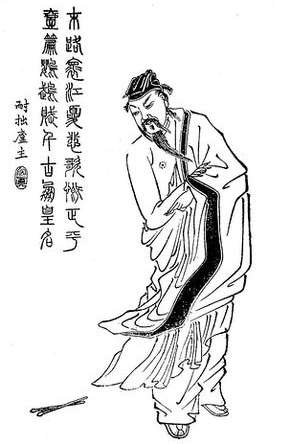
Image : A Qing dynasty portrait of the sharp-tongued scholar, Mi Heng. Public domain.
The Romance of the Three Kingdoms is filled with eccentric characters, men and women whose stories were often embellished by time, legend, and historical dramatization. While the exact definition of a “flamboyant personality” may be elusive, one thing is certain: some individuals left behind tales so extraordinary that they remain part of our cultural memory over eighteen centuries later.
One such figure is Mi Heng (Chinese: 禰衡; pinyin: Mǐ Héng), a name that barely registers in modern pop culture, yet whose audacity left even the mighty warlord Cao Cao bewildered. Known for his unmatched arrogance, poetic brilliance, and public scandals, Mi Heng remains one of the most volatile—and unforgettable—characters of his time.
【A Name Lost to Time: Mi Heng’s Vanishing Presence in Popular Culture】
Despite his outsized personality, Mi Heng is a figure largely forgotten in modern retellings of the Three Kingdoms saga. He appeared in Koei Tecmo’s Romance of the Three Kingdoms series between editions V and VIII, only to vanish from later installments. He never made it into the more action-oriented Dynasty Warriors franchise, nor was he featured in the popular manga Yokoyama Mitsuteru Sangokushi, a staple entry point for Japanese readers into the Three Kingdoms world.
Even within the games where he did appear, his portrayal was inconsistent. In editions V and VI, he was depicted as a brilliant mind—intelligence ratings over 90, political ability in the high 80s. But by editions VII and VIII, those numbers dropped dramatically. His intelligence fell into the 70s, and his political score plummeted to 34. Eventually, he disappeared from the series altogether.
It wasn’t until the rise of the internet and the spread of obscure historical anecdotes online that Mi Heng began to attract a niche following. Still, even today, his name is rarely encountered outside academic or enthusiast circles.
【The Legend Begins: The Early Life of Mi Heng】
Mi Heng was born in Qing Province and showed signs of genius from an early age. According to historical records, his memory was extraordinary—able to memorize entire texts after a single reading. His literary talents were undeniable. But so was his arrogance. His superiority complex isolated him from his peers and tainted his reputation.
In the year 196 CE, Mi Heng arrived in the city of Xuchang. There, he refused to meet with either the local gentry or the powerful warlord Cao Cao himself. Instead, he openly mocked them.
One of the most infamous anecdotes from this period occurred when someone asked if he would pay respects to officials like Chen Qun or Sima Lang. Mi Heng sneered:
“Are you telling me to visit a pig butcher or a wine merchant?”
His contempt knew no bounds. He even went so far as to declare that “Cao Cao is no great man.”
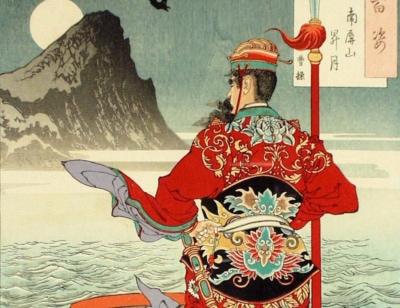
Image Caption: Cao Cao (Cáo Cāo Mèngdé), one of the most powerful figures of the era—and frequent target of Mi Heng’s scorn. Public domain.
To openly insult a man who stood as one of the leading contenders for control of China—second only to Yuan Shao—was political suicide. But Mi Heng’s brazenness would become his trademark. With this, his legend was born: not as a hero, but as a chaotic force who challenged power with cutting words and wild defiance.
【Mi Heng Unleashed】
Mi Heng’s infamy spread quickly—but it was notoriety, not respect. In Xuchang, he became a figure to avoid. Yet among the few who admired his raw intellect was Kong Rong, a renowned scholar and one of the “Seven Scholars of Jian’an.” Kong Rong saw past Mi Heng’s abrasive nature and recognized a mind of exceptional brilliance.
At the time, Cao Cao was actively recruiting talent, and despite Mi Heng’s reputation—and his insults—Cao was intrigued. His desire to meet such an unpredictable man speaks volumes about his obsession with collecting capable individuals.
Kong Rong, one of the few men Mi Heng actually respected, tried to persuade him to serve under Cao Cao. But Mi Heng refused, claiming to be afflicted with madness.
Eventually, however, a compromise of sorts was arranged. Cao Cao learned that Mi Heng was a skilled drummer and summoned him to perform at a court banquet. Whether Mi Heng accepted by choice or under pressure is unclear, but one theory suggests that Cao invoked an imperial edict, leaving Mi Heng no room to decline.
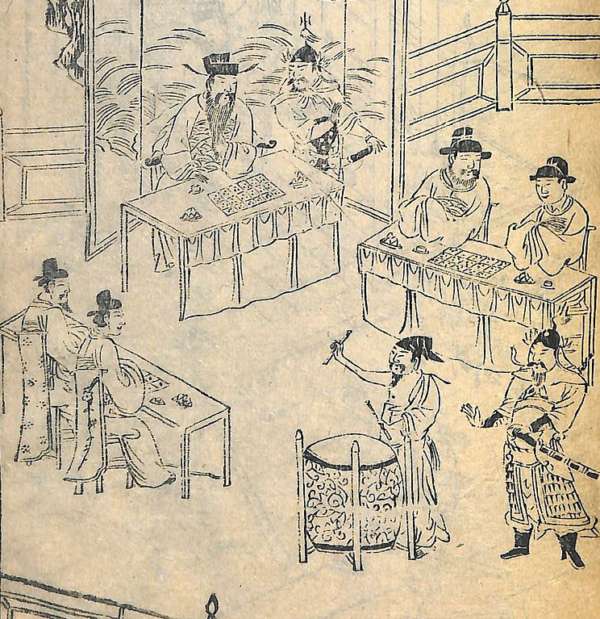
Image Caption: Mi Heng performing nearly nude before the court, an act that stunned the aristocracy. Public domain.
At the banquet, Mi Heng gave a stunning performance on the drums—only to commit a mistake during the rhythm. According to the historical record, it was customary for musicians to change attire after such a misstep. Everyone expected Mi Heng to withdraw to change his clothes. Instead, he stripped in front of the entire assembly.
Whether he continued the performance completely naked or changed on the spot is debated, but what followed was another impeccable performance that left the audience speechless.
Cao Cao, watching the spectacle unfold, could only laugh bitterly.
“I meant to humiliate him,” he said, “but it is I who have been humiliated.”
【Exiled from Xuchang】
Though Cao Cao forgave the incident, it became painfully clear that Mi Heng was too volatile to be tamed. No matter how brilliant he was, he could not be controlled—and worse, he had no desire to be.
But Kong Rong remained convinced that Mi Heng should be put to use. Perhaps driven by wounded pride after Mi Heng’s public outbursts, he continued pushing the matter with Cao Cao. At last, Mi Heng relented, saying, “If it is for you, I will go.”
On the day of the arranged meeting, Cao Cao and Kong Rong awaited Mi Heng’s arrival. Instead of a formal introduction, the gatekeeper reported that a disheveled man was sitting at the entrance, striking the ground with a stick and loudly cursing Cao Cao.
There was no need for confirmation—it was Mi Heng.
Cao Cao’s patience snapped. He ordered Mi Heng’s execution, but soon reconsidered. Mi Heng had become widely known, and killing him might reflect poorly on Cao’s tolerance. Instead, he decided to exile him to Liu Biao, the governor of Jing Province.
Though few in Xuchang had any fondness for Mi Heng, a farewell banquet was oddly arranged. In truth, it was a cruel prank—meant to shame him. When Mi Heng arrived, the guests pretended to be asleep, ignoring him completely.
Mi Heng, unshaken, began to weep and exclaimed:
“How can I not cry, surrounded by corpses who cannot speak?”
Even at his departure, he remained defiantly himself.
【Execution Under Liu Biao and Huang Zu】
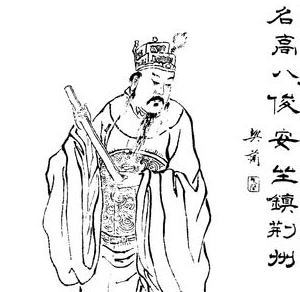
Image Caption: Portrait of Liu Biao, a regional governor who briefly sheltered Mi Heng. Public domain.
To everyone’s surprise, Mi Heng initially behaved with restraint under Liu Biao. He assisted in drafting documents and engaging in debates. Liu Biao even praised his talents.
But Mi Heng’s humility was short-lived. While he remained compliant in front of Liu Biao, he resumed his usual arrogance toward others. Eventually, complaints about his behavior reached Liu Biao, who began to distance himself. Feeling increasingly uneasy, Liu Biao sent Mi Heng further south, to serve under General Huang Zu.
At first, Huang Zu welcomed him and gave him literary responsibilities. But history repeated itself. During a banquet, Huang Zu asked Mi Heng to speak. Mi Heng responded:
“What can I say to a corpse like you?”
Enraged, Huang Zu ordered his immediate execution.
His son, Huang She, pleaded for mercy—but it was too late. Mi Heng had already been put to death. Even Huang Zu is said to have regretted the decision afterward.
【A Villain Worth Remembering】
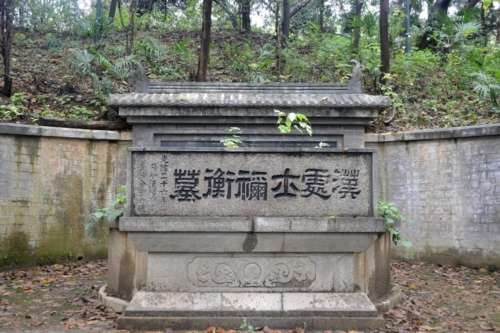
Image Caption: Tomb of Mi Heng (cenotaph), Hanyang District, Wuhan. A monument to a life both brief and brilliant. Public domain.
How old do you imagine Mi Heng was when he died?
Reading about his provocations and defiance, one might picture a grizzled, bitter elder lashing out at the world. But in truth, Mi Heng was only 26 years old when he was executed.
All of his infamy, his legend, the confrontations with Cao Cao, Liu Biao, and Huang Zu—took place within just two or three years.
His life was as volatile as it was short.
Had Kong Rong never introduced him to Cao Cao, perhaps Mi Heng would have lived longer. But considering his personality, it’s likely he would have clashed fatally with someone, sooner or later.
Cao Cao is often portrayed as a cunning villain in the Romance of the Three Kingdoms. But if anyone deserves the title of “beloved villain,” it might be Mi Heng—a man who openly ridiculed warlords and defied every rule of decorum.
He lived on his own terms, and even in death, refused to be forgotten.
Mi Heng’s story is more than just that of an eccentric. It is a testament to how, even in a rigid age, one man’s voice—however abrasive—could echo across history.
Sources
・Records of the Three Kingdoms (Sanguozhi), Wei Shu, “Biographies of Xun Yu, Xun You, and Jia Xu”
・Book of the Later Han (Hou Hanshu), Volume 80, Part II: “Biographies of Literary Figures II”


